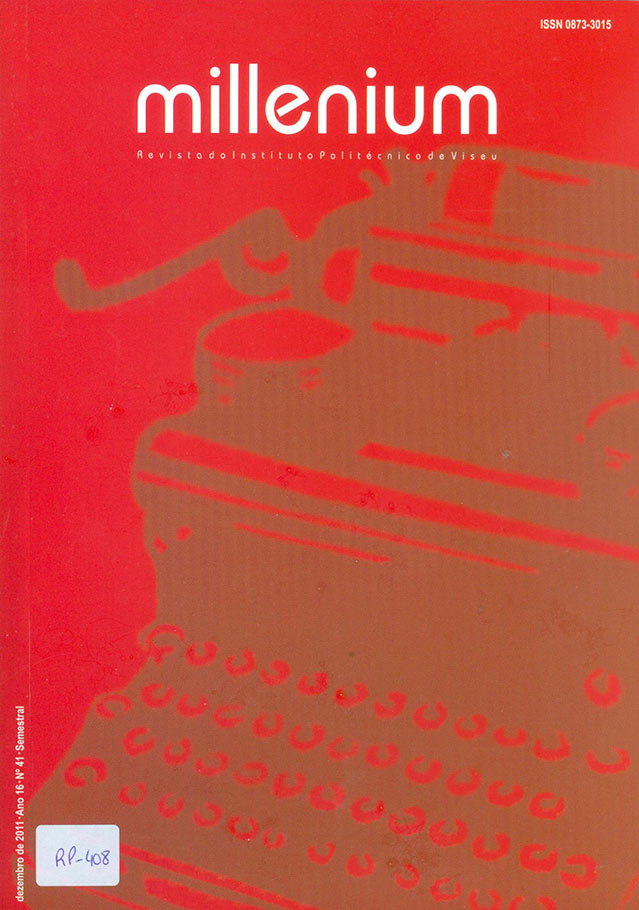Happy Days: from stage to screen. A way to approach Samuel Beckett and his absurdity to a public that is not traditionally close to his type of art
Keywords:
Beckett, theatre, cinema, happy days, absurdnessAbstract
O objetivo deste estudo consiste na análise do projeto (Beckett on Film) que adaptou Dias Felizes, uma das peças de Samuel Beckett, escrita entre 8 de outubro de 1960 e 14 de maio de 1961, ao cinema. No decorrer do artigo, é dada uma atenção especial às características visuais e à natureza concomitantemente humana e irreal das personagens de Beckett. Finalmente, é dada uma perceção global do panorama literário Beckettiano, o que inclui o projeto cinematográfico que fez com que os desejos do autor, de inexistência de variações relativamente ao que criou, prevalecessem.
Downloads
References
• Beckett, Samuel (1998). Dias Felizes. Editorial Estampa.
• ---. (2006). Novelas e Textos para nada Lisboa: Assírio & Alvim,.
• ---. (1958). Endgame. London: Grove Press.
• ---. (1981). Waiting for Godot. London – Boston: Faber and Faber.
• ---. (1986) .The Complete Dramatic Works. Kent: Faber and Faber.
• _________. (1955 and 1965). Waiting for Godot. Samuel Beckett.
• _________. (1958). Endgame. London: Grove Press.
• _________. (1961). Happy Days. Grove Press Inc.
• _________. (1957). All That Fall. London and Boston: Faber and Faber.
• _________. (1958). Act Without Words I. London and Boston: Faber and Faber.
• _________. (1959). Act Without Words II. London and Boston: Faber and Faber.
• _________. (1958). Krapp’s Last Tape. London and Boston: Faber and Faber.
• _________. (1976). Rough For Theatre I. London and Boston: Faber and Faber.
• _________. (1976). Rough For Theatre II. London and Boston: Faber and Faber.
• _________. (1959). Embers. London and Boston: Faber and Faber.
• _________. (1976). Rough for Radio I. London and Boston: Faber and Faber.
• _________. (1976). Rough for Radio II. London and Boston: Faber and Faber.
• _________. (1963). Cascando. London and Boston: Faber and Faber.
• _________. (1963). Play. London and Boston: Faber and Faber.
• _________. (1967). Film. London and Boston: Faber and Faber.
• _________. (1966). Come and Go. London and Boston: Faber and Faber.
• _________. (1970). Breath. London and Boston: Faber and Faber.
• _________. (1973). Not I. London and Boston: Faber and Faber.
• _________. (1976). That Time. London and Boston: Faber and Faber.
• _________. (1979). A Piece of Monologue. London and Boston: Faber and Faber.
• _________. (1984). What Where. London and Boston: Faber and Faber.
• Calder, John (1983). A Samuel Beckett reader. London: Picador.
• Esslin, Martin (2001). The theatre of the absurd. London: Methuen.
• ---. (1987). Samuel Beckett: A Collection of Critical Essays. Cambridge: Prentice/Hall International.
• Kenner, Hugh (1980). A Reader’s Guide to Samuel Beckett. London: Thames and Hudson.
• Knowlson, James and Elizabeth (2006). Remembering Beckett. London: Bloomsbury.
• Mcdonald, Rónán (2006). The Cambridge Introduction to Samuel Beckett. United Kindgom: Cambridge.
• Murphy, P. J. (1990). Reconstructing Beckett. Toronto: University of Toronto Press.
• Rosa, Armando Nascimento (2000). Falar no Deserto: Estética e Psicologia em Samuel Beckett. Lisboa:
Edições Cosmos.
• Uhlmann, Anthony (1999). Beckett and Poststructuralism. Cambridge: Cambridge University Press.
• The Nobel Prize in Literature 1969. Disponível em:
<http://nobelprize.org/nobel_prizes/literature/laureates/1969/>. Consultado em 28 nov. 2011.
FILMOGRAPHY:
• www.beckettonfilm.com
• Happy Days (2001). Dir. Patricia Rozema, Blue Angel Films and Tyrone Productions.
• Krapp’s Last Tape (2001). Dir. Atom Egoyan, Blue Angel Films and Tyrone Productions.
• Not I (2001). Dir. Neil Jordan, Blue Angel Films and Tyrone Productions.
• Ohio Impromptu (2001). Dir. Charles Sturridge, Blue Angel Films and Tyrone Productions.
• Play (2001). Dir. Anthony Minghella, Blue Angel Films and Tyrone Productions.
• Rough for Theatre I (2001). Dir. Kieron J. Walsh, Blue Angel Films and Tyrone Productions.
• Rough for Theatre II (2001). Dir. Katie Mitchell, Blue Angel Films and Tyrone Productions.
Downloads
Published
How to Cite
Issue
Section
License
Authors who submit proposals for this journal agree to the following terms:
a) Articles are published under the Licença Creative Commons (CC BY 4.0), in full open-access, without any cost or fees of any kind to the author or the reader;
b) The authors retain copyright and grant the journal right of first publication, allowing the free sharing of work, provided it is correctly attributed the authorship and initial publication in this journal;
c) The authors are permitted to take on additional contracts separately for non-exclusive distribution of the version of the work published in this journal (eg, post it to an institutional repository or as a book), with an acknowledgment of its initial publication in this journal;
d) Authors are permitted and encouraged to publish and distribute their work online (eg, in institutional repositories or on their website) as it can lead to productive exchanges, as well as increase the impact and citation of published work
Documents required for submission
Article template (Editable format)





